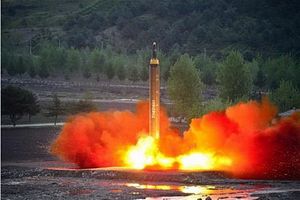Three days after launching short-range missiles on Saturday, North Korea launched a new ballistic missile on the early morning of August 29, with the missile flying right over Japan’s northern island and landing in the Pacific Ocean.
As Japan and the United States reacted strongly toward North Korea’s provocation and vowed to increase pressure, China has refused to condemn North Korea publicly. Instead, China keeps calling on all parties to exercise restraint and remain cool-headed.
On August 29, questions about North Korea’s latest missile launch dominated the regular press conference of the Chinese foreign ministry. Yet the Chinese foreign ministry spokesperson Hua Chunying refused to put out any harsh word on North Korea.
When asked if North Korea deserves special condemnation for launching missile flew over populated areas of Japan, Hua said:
The Security Council resolutions have explicit stipulations concerning the DPRK’s launch activities using ballistic missile technology, and the Chinese side is opposed to the DPRK’s launching activities in violation of the resolutions.
Then, she used hundreds of words to explain why the Korean Peninsula nuclear crisis is a complicated issue and implied that sanctions toward North Korea are useless:
[T]he Security Council has passed several resolutions, and sanctions never stop, but do they really have any actual effects? Everyone notices that sanctions and missile launches are happening side by side…The current development of the situation has just proved once again the fact that sanction and military pressure alone will never be the final way out.
Rather than criticizing North Korea, Hua suggested that other parties–the United States, South Korea and Japan–had prompted “the vicious cycle of endless nuclear tests, missile launches and military drills.” So, she demanded them to reflect their own responsibilities:
[T]o those who simply cannot stop talking about sanctions, I would like to ask them whether they have been comprehensively and earnestly implementing the Security Council resolutions in a balanced way? Or rather did they put undue amount of emphasis on sanctions while making no efforts to create necessary conditions and environment for the resumption of the Six-Party Talks?
Once again, Hua put forward China’s “suspension-for-suspension” proposal and called on all parties to “exercise restraint and remain cool-headed about the current situation.”
“Suspension for suspension,” or “dual suspension” was a proposal made by Beijing in March where Pyongyang would declare a moratorium on both nuclear and missile tests in exchange for the United States and South Korea halting large-scale joint military exercises. The proposal is welcomed by North Korea, but has been unsurprisingly rejected by the United States and South Korea.

































